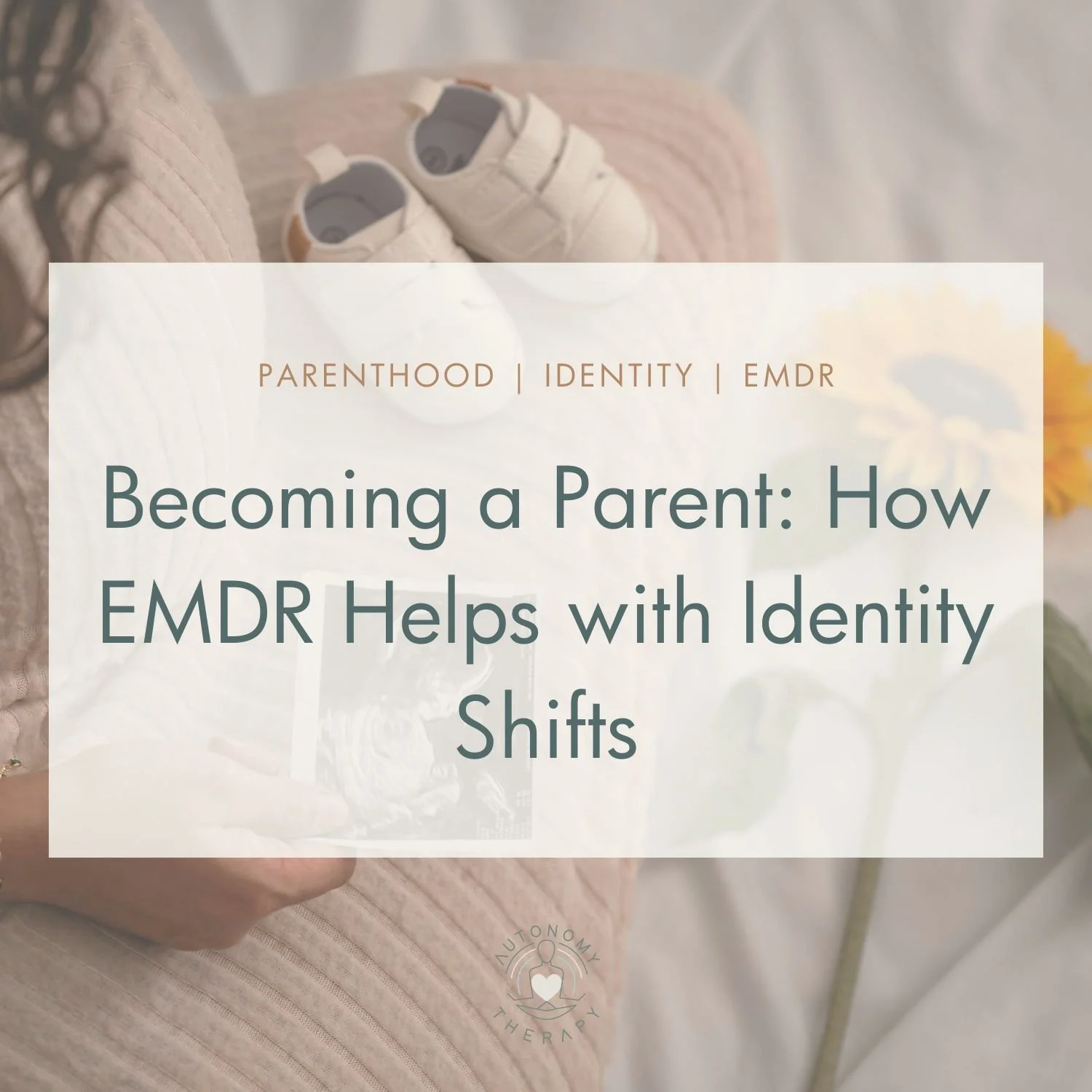Seek Trauma + EMDR Therapy at Autonomy Therapy
Trauma can leave individuals feeling hopeless, afraid, lonely, and unsure of how to trust or connect with others. If past experiences continue to affect your quality of life, you are not alone. At Autonomy Therapy, we offer trauma-informed care and specialized EMDR therapy to help you process the memories, emotions, and beliefs that may still feel stuck.
What is EMDR Therapy?
EMDR therapy uses structured, evidence-based techniques that support your brain’s natural ability to heal. Many people find that EMDR offers clarity, relief, and a deeper sense of safety within themselves. Our therapists create a calm, collaborative space where you can explore your experiences at your own pace and feel supported throughout the process. If you are ready to better understand your story and experience more ease in your daily life, we are here to walk with you. Scroll down to learn more about how we use EMDR at Autonomy Therapy!
What is trauma?
Trauma is the emotional response to a distressing experience or event. Trauma can be psychological, physical, or spiritual. It can be one singular event, like a car accident, or an ongoing experience like prolonged stress in childhood due to neglect. Trauma is not only the event or experience but an individual’s reaction to it. Trauma can change the way we act, feel, and think long after a traumatic event. That’s right – trauma can change our brains. In reaction to stress, our brain goes into “fight-or-flight” mode in order to protect ourselves.
Once the threat passes, our body gets the message that we are no longer in danger. However, sometimes when a traumatic event occurs, our brain gets stuck in that mode, leading to a constant state of hypervigilance and difficulty regulating our emotions or feeling safe. That’s where trauma therapy comes in! Trauma therapy can help you to rewire your brain, reconnect to your body, and find a felt sense of safety within yourself once again.
Traumatic events Requiring trauma therapy may include - but are not limited to - the following:
Physical violence or abuse
Combat situations
Sexual violence or abuse
Natural disasters
Childhood abuse and neglect
Witnessing violence or death
Poverty
Homelessness
Job loss
Discrimination
Life-threatening accidents
Illness or injury of self or loved one
Racism and social injustice
Generational trauma
Death of a loved one
Betrayal in an intimate relationship
PTSD Vs. Complex PTSD
PTSD (Post-Traumatic Stress Disorder) and CPTSD (Complex Post-Traumatic Stress Disorder) are both trauma-related disorders, but they differ in causes and symptoms:
PTSD: Usually results from a single traumatic event (e.g., car accident, assault, natural disaster, combat). Symptoms can include, but aren’t limited to, flashbacks, nightmares, hypervigilance, avoidance, and emotional numbness.
CPTSD: Stems from prolonged, repeated trauma (e.g., childhood abuse, domestic violence, captivity). Includes PTSD symptoms plus emotional dysregulation, low self-worth, and difficulty in relationships.
Everyone reacts to trauma differently, but common symptoms of Trauma include the following:
Hypervigilance
Exaggerated startle response
Insomnia
Avoidance of people, places, or things that bring up memories of trauma
Social withdrawal
Numbing through substances or behaviors
Nightmares or flashbacks
Intrusive memories
Shame
Irritability
Hopelessness
Mood swings
Chronic pain
Anxiety or panic
Depression
Dissociation
Difficulty concentrating
Memory issues
Trauma can often lead to post-traumatic stress disorder (PTSD), depression, anxiety, substance misuse, and eating disorders. Our therapists offer trauma counseling in Austin, TX and the greater TX region. If you’re ready to seek CPTSD treatment, PTSD treatment, and anything in between: We’re here for you.
EMDR For Trauma
Some of our therapists are also trained in EMDR (Eye Movement Desensitization and Reprocessing). EMDR therapy treatment is described by some as “a magic wand.” EMDR therapy is a form of therapy that allows individuals to safely reconnect with images, body sensations, emotions, and thoughts associated with trauma. Under the care of a trained therapist, clients reprocess traumatic information within the safe environment of the therapist’s office until the thoughts no longer have a disruptive impact on their lives.
Check out this page to see which of our Autonomy Therapists are EMDR-Trained!
Our Approach to Trauma Therapy in Austin, TX
Our therapists use trauma-informed care, including therapy to treat PTSD. We aim to create a safe therapeutic space to heal from trauma through transparency about treatment, building rapport and trust, and prioritizing your autonomy and voice in your healing journey. We use a collaborative approach in which you decide when and what you feel comfortable sharing. Our trauma therapists also consider how the unique pieces of your identity shape your story and work not to make assumptions about your experience. We understand trauma is something that happened to you and not who you are.
In trauma therapy, you will work with your therapist to explore helpful coping tools and challenge unhelpful beliefs stemming from trauma. Therapy can provide a validating space to build trust in others and feel safe again. Holding trauma can be an isolating experience, and through trauma therapy, you can work to reconnect with others and with yourself.
Meet Our EMDR Team
Begin Trauma Therapy in Austin, TX
When you are ready to process your trauma safely, Autonomy Therapy can help you. Our skilled trauma therapists offer therapy to treat PTSD, therapy to treat CPTSD, and everything in between. Sessions will help you heal in a safe, informed, and productive way. Get started today:
Schedule time to speak with our Client Care Coordinator using the CONSULTATION FORM.
You’ll be connected to one of our caring trauma therapists.
Let the healing begin with the clinician who’s the best fit for you!













